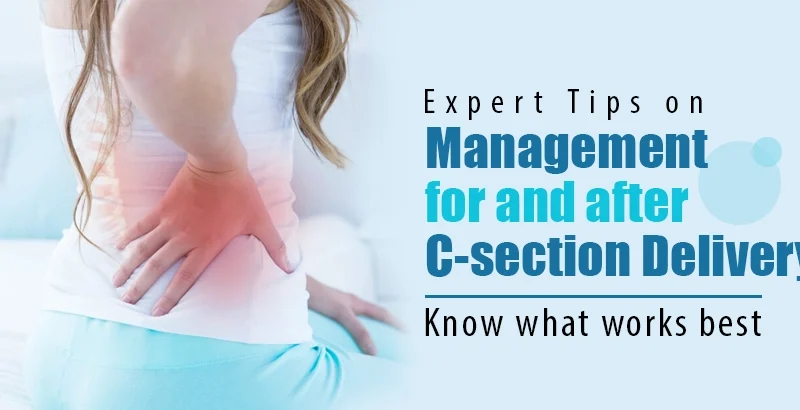Expert Tips on Management For C-section Delivery

You may have to deliver a baby either vaginally or via an Emergency C-section. Maybe a C-section is not a painful procedure as you will be with regional anaesthesia – like an epidural or spinal block. It’s important to remember that during a C-section, you may feel some pulling or pressure, but you won’t feel pain. Nevertheless, recovery from a C-section can be more painful and take longer than recovering from a vaginal birth.
In case you deliver the baby via an emergency C-section, you’ll need time to recover. Therefore, before undergoing a C-section and during a C-section delivery, you need a few medical and natural management tips. The tips are as follows:
Take a Shower Before Your Emergency C-section Delivery
Wash your body clean with a bar of soap. Take a clean towel and dry it off. Use chlorhexidine gluconate cloths (CHG) given to you by the nurse, and wipe the front of your body – from below the breasts, down the thighs, and over the abdomen. Let your skin dry, and dress in clean clothes. You must avoid shaving near the surgical site, and wipe the genital area. Bathe again on the morning of surgery, and repeat all those things that you did the night before the surgery.
Your Diet Before Your Emergency C-section Delivery
8 hours before the C-section, you must drink water, juice, broth, tea, etc. If you have diabetes, you can consume a sugar-free sports drink to stay hydrated before your emergency C-section delivery. You can have a light meal or low-fat snack up to 6 hours before your C-section.
Stopping Medicines
It’s crucial to heed your doctor’s advice when it comes to stopping medications before an emergency C-section. If you’re taking blood thinners for instance, your doctor may recommend discontinuing them before the surgery. In cases where your last heparin injection was within 24 hours of the emergency C-section, a general anaesthetic may be necessary. Always follow your healthcare practitioner’s recommendations for the best possible outcome.
Arrival at the Hospital
Consult your healthcare provider regarding your arrival time. Plan to arrive 2 hours before the scheduled time of the surgery. This will give you time to get admitted and prepare for labour and delivery of your child.
Assistance in the Labour and Delivery Room
Yes, that’s true! You can include support for instance midwife, your partner or any other friends or family members – who will sit next to you hold your hand, and help you breathe and relax before and during your surgery.
Things To Do Just Before Surgery
You may have to sign the consent forms for surgery, if that’s not already done, and meet the anaesthesia, and delivery team. The nurse will then put an intravenous (IV) line in your arms to extract the blood (blood sugar test), clip the pubic hair, and also check the foetal heart rate. He or she will put wraps on your legs to prevent blood clotting. The nurse will also put a Foley catheter in your bladder to drain the urine out. The anaesthetic team will give spinal anaesthesia or put in an epidural.
In The Operating Room
You’ll tend to be in the operating room for about 60 to 90 minutes to deliver the baby. Most of the time, you’ll give birth to the baby in 10 minutes. Once the baby is delivered, healthcare professionals will check your baby’s health, bring your baby close to your skin, and help you start breastfeeding. The healthcare practitioner will take the baby to the Neonatal Intensive Care Unit (NICU) if extra care is required.
After Surgery
The new mom, after childbirth, can move, eat, and use the restroom for a few hours. After the surgery, within 72 hours, there are chances of your feeling feverish, infectious, or having digestive problems. There might also be symptoms of preeclampsia, headache, visual changes, etc. If your doctor determines that it is necessary, a wound vac will be placed. They will discuss this option with you and provide you with all the information you need. So, as a stage of recovery, walking will help you heal. You need to eat small meals. Breastfeeding works on your entire body and mind. Finally, your catheter will be removed.
Pain Controlling Ways
12 to 18 hours after the surgery, you will be receiving medicines to reduce the pain. Additionally, you will have to take medicines for your bowel movements, postpartum nausea, and heartburn. You may also have to take birth control pills if desired.
However, as far as natural remedies are concerned you may do the following:
- Take a lukewarm bath.
- Try not to scrub your incision.
- Reduce the household chores. Try not to lift weights within the household.
- Refrain from using tampons, engaging in sexual activity, or inserting anything into your vagina.


